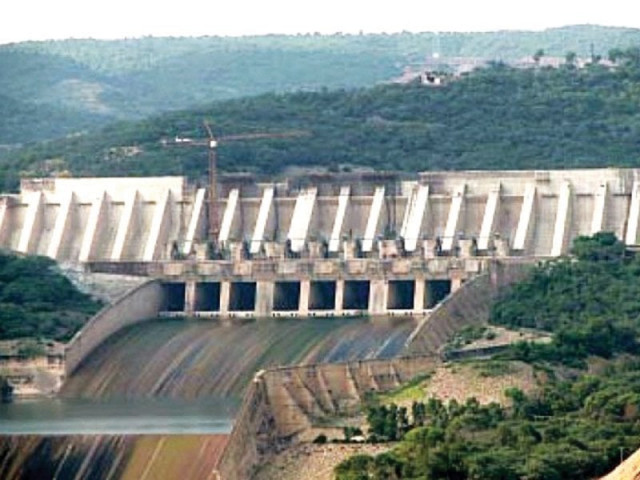Diamer-Bhasha dam gets go-ahead at last
Multi-billion rupee project divided into components to reduce cost

PHOTO: FILE
Headed by Prime Minister Shahid Khaqan Abbasi, the Executive Committee of the National Economic Council (Ecnec) approved five mega projects at the total cost of Rs504 billion.
The Central Development Working Party (CDWP) had cleared the Diamer-Bhasha dam at a cost of Rs625 billion. Subsequently, the planning ministry excluded the land component and construction of a colony from the dam cost, bringing the price tag down to Rs474 billion.
Pakistan stops bid to include Diamer-Bhasha Dam in CPEC
The dam will have a 6.4 million acres feet live storage capacity and an installed power capacity of 4,500 megawatt, according to an announcement by the Prime Minister Office.
However, the power house component will be approved separately and the Rs474 billion cost is meant for building the reservoir.
On completion, the project will increase national water storage capacity from 38 days to 45 days and enhance life span on downstream reservoirs, including the Tarbela Dam, said the PM Office.
The project will also increase the Dasu hydropower project efficiency by 28%, according to a planning ministry official.
The Water and Power Development Authority (Wapda) informed the prime minister that land issues have to be sorted out before starting the construction of the dam, according to the officials.
Successive governments have given Rs138 billion for land acquisition and resettlement. Most of this work has already been done and the government has spent Rs58.3 billion on land acquisition. An amount of Rs53.5 billion has additionally been approved for resettlement.
In the past 17 years, almost every head of the state and the government has performed the groundbreaking ceremony of the project but civil work could not begin due to lack of financial resources.
For the next fiscal year, the government has proposed an allocation of Rs18 billion for the construction of the dam.
For water sector, the government has proposed an allocation of Rs59 billion which is far lower than Rs100 billion being proposed in the National Water Policy.
The Council of Common Interests – the highest constitutional body dealing with the issues between the Centre and the provinces – unanimously approved the Diamer-Bhasha dam project in July 2010.
The project has been divided into two parts to reduce its size and financing requirements after the World Bank, the Asian Development Bank and China refused to fund the project. Pakistan has been struggling to raise money from international institutions amid Indian opposition to the project.
In order to facilitate early implementation of the project, Wapda has been entrusted to have an overall control and implementation responsibility of the project.
Wapda will be responsible for dam construction and the National Highway Authority has been tasked with relocating parts of the Karakoram Highway that would be submerged in water.
The project will contribute towards alleviation of acute water shortages in the Indus Basin Irrigation System caused by progressive siltation of existing reserves.
After much delay Diamer-Bhasha dam wins approval
The powerhouse, when completed, is expected to enhance power generation capacity by 4,500 megawatt. Pakistan has not built any major water reservoir since Tarbela Dam and Mangla Dam were built in the 1960s.
Ecnec also approved the Gwadar-Lasbela Livelihoods Support Project at the rationalised cost of Rs3 billion.
For evacuation of power from 1,320 MW RLNG Power Plant near Trimmu in Jhang, Ecnec also approved Rs4.23 billion project.
Ecnec approved the federal programme under ‘Access to Justice Programme’ at a total rationalised cost of Rs4.7 billion. The ongoing project aims at implementing legislative, judicial, police and administrative reforms with the construction of required physical infrastructure, including office buildings.
Ecnec also approved replacement of old and obsolete Signal Gear from Lodhran-Multan-Khanewal-Shahdara Bagh Main Line Section of Pakistan Railways at a cost of Rs1.4 billion.
The scope of work of this project also includes remodeling of the Yousafwala Railway station and upgradation of 24 unmanned railway-level crossings into manned-level crossings.



















COMMENTS
Comments are moderated and generally will be posted if they are on-topic and not abusive.
For more information, please see our Comments FAQ